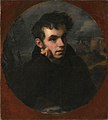Golden Age of Russian Poetry
Golden Age of Russian Poetry (or Age of Pushkin) is the name traditionally applied by philologists to the first half of the 19th century.[1] The most significant Russian poet Pushkin (in Nabokov's words, the greatest poet this world was blessed with since the time of Shakespeare[2]) and other famous poets worked during this time. Mikhail Lermontov and Fyodor Tyutchev are generally regarded as two most important Romantic poets after Pushkin.[3] Other poets include Pyotr Vyazemsky, Anton Delvig, Kondraty Ryleyev. The best-regarded of Pushkin's precursor Vasily Zhukovsky and Konstantin Batyushkov may be also included. Pushkin himself, however, considered Evgeny Baratynsky to be the finest poet of his day.[citation needed]

Evgeny Baratynsky
Poets[]
References[]
- ^ John, Gary (2009-08-07). "LESSON 4 The Golden Age: Aleksandr Pushkin". Department of Slavic and Central Asian Languages , University of Minnesota. Retrieved 2012-03-23.
- ^ Boyd, Brian (2011). Stalking Nabokov: Selected Essays. New York: Columbia University Press. p. 203. ISBN 978-0231158565.
- ^ Nabokov, Vladimir (1944). Three Russian Poets: Selections from Pushkin, Lermontov, and Tyutchev. New York: Norfolk: New Directions.
See also[]
Categories:
- 19th-century Russian literature
- Golden ages (metaphor)
- Poetry movements
- Russian literary movements
- Russian poetry
- Russia stubs
- Poetry stubs



